Back in February we noted that the contributions from the BBC’s ‘special correspondent’ Fergal Keane to coverage of the war between Israel and Hamas had consisted of items presenting a monochrome and highly limited view of the conflict from the perspective of Palestinians, with most playing heavily on the emotions of readers or viewers.
BBC’S FERGAL KEANE CITES LAWFARE NGO IN RAFAH REPORT
We also noted that although the overwhelming majority of those items relate to stories from the Gaza Strip, they were mostly produced by journalists not present in the territory, with repeat contributions from filmmaker Alice Doyard and a relatively new BBC employee, Haneen (or Hanin) Abdeen.
Since that post appeared, the BBC News website has published additional items by Keane in the same partial style, over half of which are also credited to Doyard and Abdeen:
“Gaza children searching for food to keep families alive”, 26/2/24 by Fergal Keane, “With additional reporting by Alice Doyard, Haneen Abdeen, Gidi Kleiman and Stephanie Fried.”
“Gaza crisis: A boy’s journey for food to feed family”, 26/2/24 by Fergal Keane
“Gaza aid drop: Devastation after more than 100 reported killed at Gaza aid drop”, 29/2/24 by Fergal Keane, discussed here
“Fergal Keane: Aid convoy tragedy shows fear of starvation haunts Gaza”, 2/3/24 by Fergal Keane, discussed here
“Gaza widows and orphans struggle with loss in makeshift camp”, 5/3/24 by Fergal Keane, “With additional reporting by Haneen Abdeen and Alice Doyard”
“West Bank violence: ‘My child’s destiny was to get killed’”, 8/3/24 by Fergal Keane, “With additional reporting by Alaa Badarneh, Alice Doyard and Haneen Abdeen.”
“Israel-Gaza: Baby saved from dead mother’s womb after Israeli strike”, 22/4/24 by Fergal Keane
“Searching for missing loved ones in Gaza’s mass graves”, 24/4/24 by Fergal Keane, “With additional reporting by Alice Doyard, Haneen Abdeen, Nik Millard and Shereen Youssef”
“Baby saved from dead mother’s womb in Gaza dies”, 26/4/24 by Fergal Keane
“The US doctor who cannot forget what he saw in Gaza”, 28/4/24 by Fergal Keane, “With additional reporting by Alice Doyard, Annie Duncanson, Haneen Abdeen, Nik Millard”
“Israel-Gaza war: ‘My children cling to me as dogs raid Rafah graves near our shelter’”, 5/5/24 by Fergal Keane, “Additional reporting by Alice Doyard and Haneen Abdeen”
On the afternoon of July 12th the BBC News website published another item in the same mould. Titled “Death and rubble fill streets of Tal Al-Sultan as rescuers dodge Israeli fire”, the report is credited to “Fergal Keane in Jerusalem” and states that it was created “With additional reporting by Haneen Abdeen, Alice Doyard and Nik Millard”.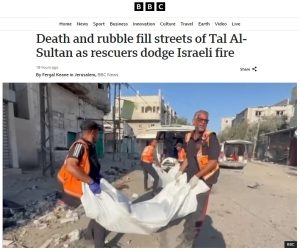
The report opens in Keane’s typically emotional and dramatic style:
“The things they see. The dead girl lowered by a rope from a ruined building. She sways slightly, then comes to rest, legs folding beneath her on the rubble.
They see people and parts of people lying out in the open where the blast or the bullet caught them. Violent death in all of its contortions.
Bodies lying in the streets, in the blasted open sitting rooms of houses, under the rubble. Sometimes covered by so much concrete the men will never reach them, and only in the future when the war is over will somebody come and give them a decent burial.
The men of the Gaza Civil Defence cannot close their eyes to any of this. There is no shutting out the smell. Every sense is on alert. Death can come from the skies in an instant.”
At no point in Keane’s report are readers informed that the Gaza Civil Defence – which has been the source of several BBC reports of late – is run by Hamas. In fact, the word Hamas does not appear even once throughout Keane’s entire 1,081-word report.
Linking to one of the BBC’s inadequate reports about recent fighting in the Shuja’iya district of Gaza City and refraining from informing readers of events in the Tal al-Sultan neighbourhood of Rafah which is named in his headline, Keane goes on:
“When the fighting in places like Shejaiya in eastern Gaza City, or Tal Al-Sultan, near Rafah, in the south, is as fierce as it has been in the last few days, the ambulances of the Civil Defence dare not venture out.
“Entering areas close to the Israeli occupation is dangerous, but we try to intervene to save lives and souls,” says Muhammed Al Mughayer, a local Civil Defence official.
He and his men seize any lull in the conflict to recover the dead and the wounded. Families constantly ask about missing relatives.
“It is very difficult to identify the bodies,” explains Mr Mughayer. “Some remain unidentified due to complete decomposition.”
Stray animals also prey on the corpses, tearing off clothes and scattering papers that might be used to identify them.
The ambulance crews are short of fuel. Two days ago one broke down in Tal Al-Sultan and had to be towed out, a nerve-wracking experience for the crews. The risk of being fired on by the Israeli forces, says Mr Mughayer, means seriously injured people often cannot be rescued.
“There is currently a report of an injured person near Al-Salihin Mosque from two days ago, but we can’t reach them due to delays in coordination. It may result in their death.””
Although Keane found fit to include a photograph of Mughayer in his report, he did not bother to inform readers that the “official” – who is actually in charge of the supply department at Gaza’s Civil Defense unit – previously gave an interview to an Egyptian media outlet in which he inaccurately claimed that tents had been hit by missiles in Rafah and falsely told NBC that the location concerned was “a designated humanitarian area”. Neither did Keane bother to tell his readers that Mughayer (also spelt Mughir, Moghier, Mughayir) was previously one of those who spread disinformation concerning mass graves at the Nasser hospital and promoted falsehoods concerning ‘organ theft’ at Shifa hospital.
Keane goes on:
“Sharif Abu Shanab stands outside the ruins of his family home in Shejaiya with an expression that is part bewilderment, part grief.
“My house had four floors, and I can’t enter it,” he says. “I can’t take anything out of it, not even a can of tuna. We have nothing, no food or drink. They bulldozed all the houses, and it is not our fault. Why do they hold us accountable for the fault of others? What did we do? We are citizens. Look at the destruction around you…
“Where do we go, and to whom? We are thrown in the streets now, we have no home or anything, where do we go? There is only one solution and that is to hit us with a nuclear bomb and relieve us of this life.””
Interestingly, Sharif Abu Shanab gave a virtually identical statement to the Associated Press news agency, which was then promoted by several other media outlets:
“Sharif Abu Shanab found his family’s four-story building collapsed. “I can’t enter it. I can’t take anything out of it, not even a can of tuna. We have nothing, no food or drink,” he said.
Since fleeing the district, his family sleeps in the streets, he said. “Where do we go and to whom? … We have no home or anything,” he said in despair. “There’s only one solution, hit us with a nuclear bomb and relieve us of this life.””
Both Muhammed Al Mughayer and Sharif Abu Shanab appear in a filmed version of Keane’s report which was aired on the BBC’s ‘News at Ten’ programme on the evening of July 12th and in an audio version aired on the BBC Radio 4 programme ‘PM’ (from 20:06 here) on the same day. As usual BBC audiences were not informed who did the filming and interviewing or who set up the interviews with the Hamas-run Gaza Civil Defence representative and the Sheja’iya resident, apparently for both the BBC and the Associated Press.
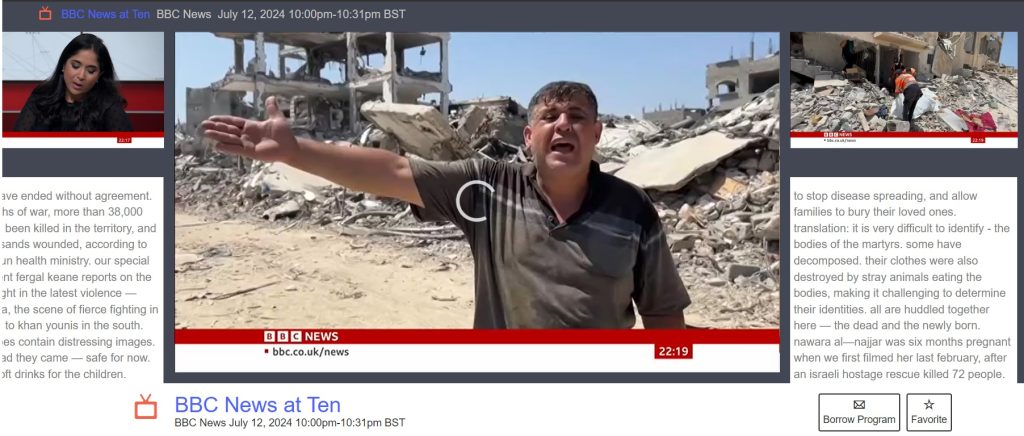
Keane closes his report by returning – and linking – to the story he produced in February.
“Since February, we have been following the story of Nawara al-Najjar whose husband Abed-Alrahman was among more than 70 people killed when Israeli forces launched an operation to rescue two hostages in Rafah.”
That report still promotes claims made by an NGO that is linked to the PFLP terrorist organisation and the director of which, Raji Sourani, is listed as one of the advisors to the South African delegation which brought proceedings against Israel to the ICJ late in 2023 without any mention on the BBC’s part of that NGO’s political agenda.
In August 2023 Fergal Keane told the Guardian that:
“The other good thing is it’s no longer possible for foreign correspondents to drop into people’s countries, write whatever they want, go away, and not get called on it if it’s bullshit. It was an almost neo-colonial form of journalism.”
Those words hold a particular resonance in light of “special correspondent” Keane’s periodic visits to Jerusalem since last October, during which he has produced over twenty entirely one-sided, highly emotional reports on events in locations that he himself has not visited. Keane’s reports are serially non-transparent on the issue of the methodology of their production and include uncritical citations from problematic sources. Clearly it very much is still possible for journalists to “drop into other people’s countries” and write “whatever they want”, including the promotion of specific and politically motivated narratives.
Related Articles:
HOW DID A BBC REPORT ON ‘MASS GRAVES’ COME ABOUT?
BBC NEWS YET AGAIN TOUTS HAMAS DENIALS OF EXPLOITATION OF HOSPITALS

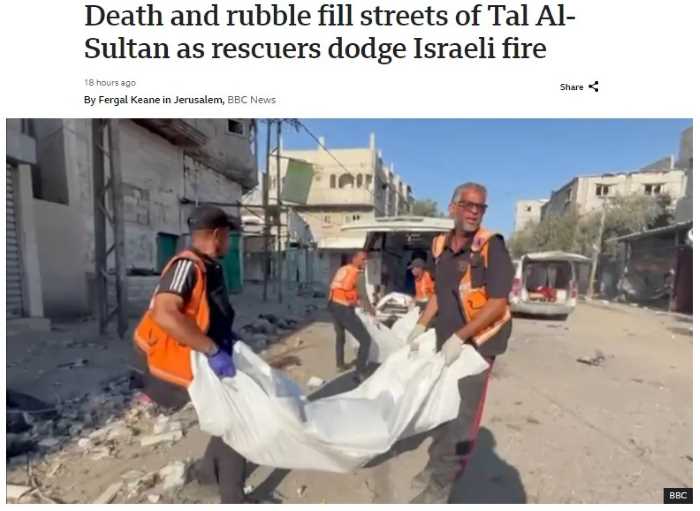
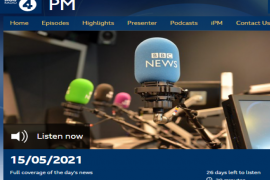
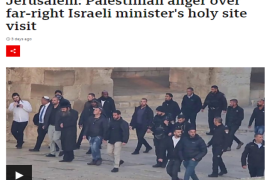

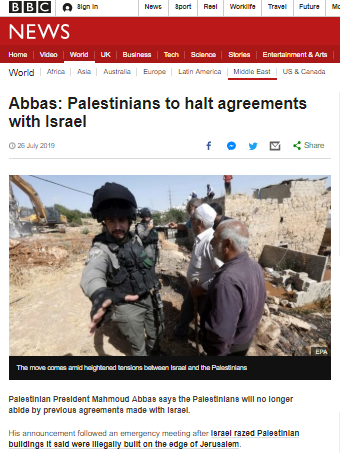
He should be banned by the Israeli Government Press Office that issues journalists with Official Press Cards